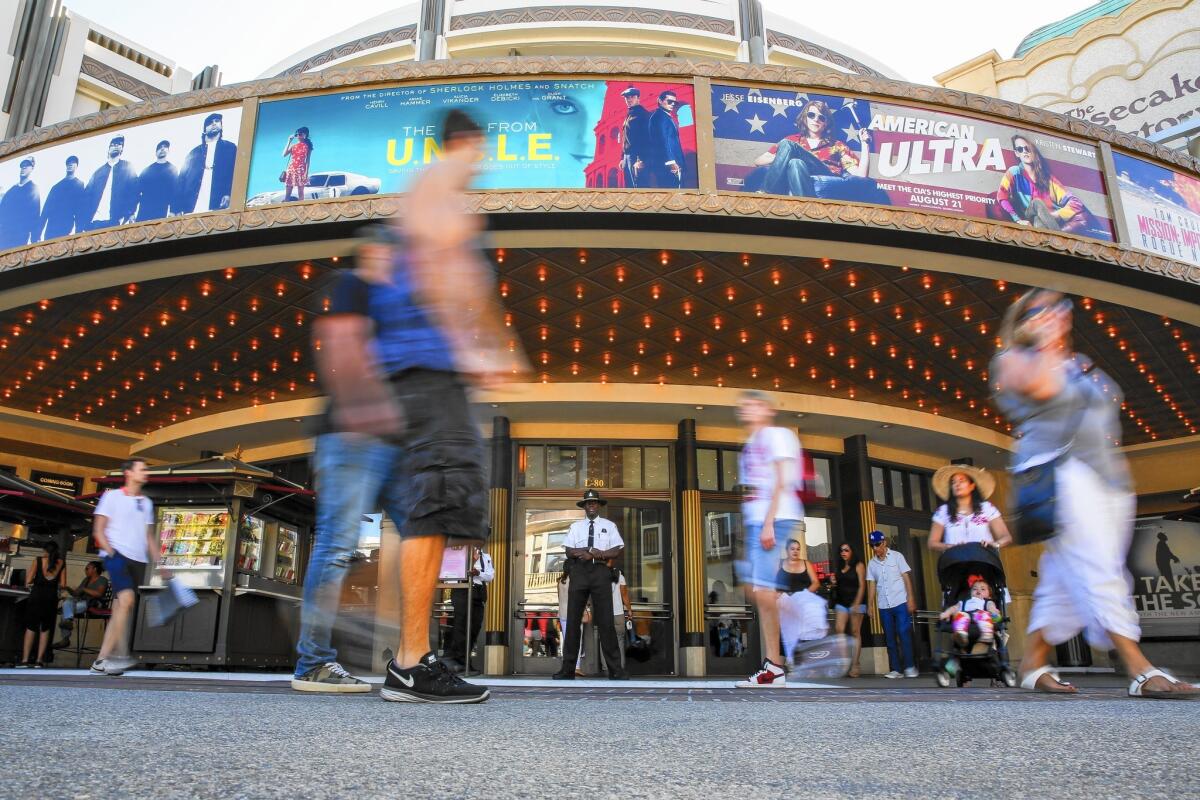Hollywood on track for one of strongest summers ever at box office

- Share via
Becca Green, 22, and Aaron Rosenberg, 23, have plenty they could be doing on a hot summer weekend in Los Angeles.
But for their Saturday afternoon date, they decided to catch “Straight Outta Compton” at the Grove shopping center, followed by dinner.
“For certain movies I feel like a cinematic experience really helps relay the message better,” said Rosenberg, a business consultant. “A big screen and surround-sound is better than watching on your computer and having it get pixely halfway through.”
Stunning photos, celebrity homes: Get the free weekly Hot Property newsletter >>
Hollywood is on track to post one of its strongest summers ever at the box office, and a big part of that has been its success in bringing in the young adults who remain the most frequent moviegoers — despite all the hand-wringing that younger people are shunning traditional media in favor of streaming services, video games and digital entertainment.
It wasn’t all roses — 20th Century Fox’s “Fantastic Four” flopped, and Adam Sandler added to his string of box-office duds with Sony Pictures’ “Pixels.” But when the summer box-office season wraps up on Labor Day, ticket sales are expected to reach $4.4 billion in the U.S. and Canada, up 8% over last summer, tying it for the second-best summer ever (the record of $4.75 billion was set in 2013).
Like Green and Rosenberg, many moviegoers are young people on dates or families looking for a relatively low-cost diversion. Although average ticket prices reached a record $8.17 last year, going to the movies is still a bargain compared with other activities such as sporting events, concerts or theme parks.
“It’s the most affordable form of entertainment out there,” said John Fithian, president of the National Assn. of Theatre Owners. “Even a night of bowling is more expensive than what we are.”
Photos: The billion-dollar box office club
The key is that Hollywood has to deliver the goods. This summer, it did with films that were fan favorites, critically acclaimed or both. Universal’s “Jurassic World” alone has made nearly $643 million this summer.
“If you have films people want to see and you’ve made them well and marketed them well, people will continue wanting to see them,” said Nick Carpou, Universal’s head of domestic distribution. “It’s good for everyone because it keeps the habit of going to the movies fresh.”
Given the importance of the summer box office, studios have done a better job of selecting their summer slates, timing their releases so they don’t cannibalize one another’s audience.
Universal, for example, moved the “Despicable Me” spinoff, “Minions,” from December 2014 to July, a month that had worked well for “Despicable Me 2.” The switch paid off handsomely as the film has generated more than $320 million domestically.
Among the fans of the animated film were Marquis Skinner, 26, and his 5-year-old son J.R.
“Going to the movies is a good way to get out of the house and get immersed in the story,” said Skinner, who was taking his son to see “Ant-Man” last week. “He likes seeing all the characters and pretending he’s them. It’s good for his imagination and creativity.”
Like many family movies, “Minions” also got a boost from Latino audiences, who accounted for an estimated 34% of ticket sales on opening weekend.
See the most-read stories this hour >>
“The Hispanic family audience is a key factor to the success of any of these family movies,” said Paul Dergarabedian, a senior media analyst for Rentrak.
Studios also have been careful to balance out their slates to provide a mix of movies. This summer, for example, many female-driven films were timed to be released concurrently with male-centric films.
So on the same June 5 weekend that Vinny and the boys hit the big screen with “Entourage,” Melissa McCarthy’s comedy “Spy” debuted. Amy Schumer’s comedy “Trainwreck” launched July 17 against Marvel’s “Ant-Man.”
“If you have a balanced slate of films and offer something to all people, you end up in a pretty good place,” said Chris Aronson, 20th Century Fox’s head of domestic distribution.
Studios also are making more money from movies because of surcharges from Imax and other large-format screens as well as 3-D.
Despite the higher revenues, however, theaters still face long-term declines in theatrical attendance as they face more competition for entertainment in the home. Last year, the number of admissions to theaters in the U.S. and Canada fell 6% to 1.27 billion, compared with 1.5 billion a decade earlier.
Confronted with such declines, theaters have worked to get more money from patrons through premium services, such as serving alcohol and gourmet foods.
With the financial support of studios, cinemas in recent years have invested heavily in replacing film projectors with digital systems.
“Our members have made tremendous improvements in the experience itself,” said Fithian of the theater owners association. “This not a technology-behind industry.”
For 27-year-old movie buff Rachel Noble, the new technology made all the difference when she saw “Jurassic World” on the big screen.
“I saw it on the 40-foot-tall screen at TCL [Chinese Theatre] in Hollywood and I loved it,” said Noble, wearing a “Jurassic World” T-shirt while standing in line at the Grove to buy tickets for “Straight Outta Compton.” “It was like life-sized dinosaurs.”
The summer’s box office was driven by Universal and Disney, each of which grossed more than $1 billion. Universal was the leader with a string of hits that included “Jurassic World,” “Pitch Perfect 2” and “Straight Outta Compton,” the music biopic about hip-hop pioneers N.W.A that became a cultural phenomenon. Disney scored with the Pixar movie “Inside Out” and the Marvel superhero film “Ant-Man.”
Warner Bros., Hollywood’s biggest film studio and frequent box-office leader, came in third place this summer as hits such as “Mad Max: Fury Road” and “San Andreas” were tempered by misses including “Entourage” and spy drama “The Man From U.N.C.L.E.”
SIGN UP for the free Indie Focus movies newsletter >>
Not helping matters was the studio’s decision to push back “Batman v Superman: Dawn of Justice” from this summer to March 2016.
Hollywood hopes to finish the year strong. This November and December, theatergoers are expected to flock to the newest James Bond movie “Spectre,” “The Hunger Games: Mockingjay — Part 2” and “Star Wars: The Force Awakens.”
Other highly anticipated films on deck this fall include 20th Century Fox’s young-adult sequel “Maze Runner: The Scorch Trials,” Warner Bros.’ latest Rocky franchise film “Creed” and Universal Pictures’ “Steve Jobs.”
“The industry is alive and well,” said Dan Fellman, president of domestic distribution for Warner Bros. “I do think this is going to be the biggest year in the history of the domestic box office.”
Fellman and other studio executives expect domestic box-office revenue will reach $11 billion this year, surpassing the record of $10.9 billion in 2013. That’s not counting growing sales from China and other countries.
“The notion that people aren’t going to the movies anymore and the industry is dying is absurd,” said Phil Contrino, vice president and chief analyst at BoxOffice.com. “People don’t go to the movies by reflex, they go to the movies because they are excited by the content. There were plenty of massive hits this year and there are more to come.”
MORE:
Bag check or snack check? Regal patrons react to new security policy
Warner Bros. in talks to produce local language movies in China through joint venture
5 reasons ‘Straight Outta Compton’s’ now the No. 1 music biopic of all time
More to Read
From the Oscars to the Emmys.
Get the Envelope newsletter for exclusive awards season coverage, behind-the-scenes stories from the Envelope podcast and columnist Glenn Whipp’s must-read analysis.
You may occasionally receive promotional content from the Los Angeles Times.












